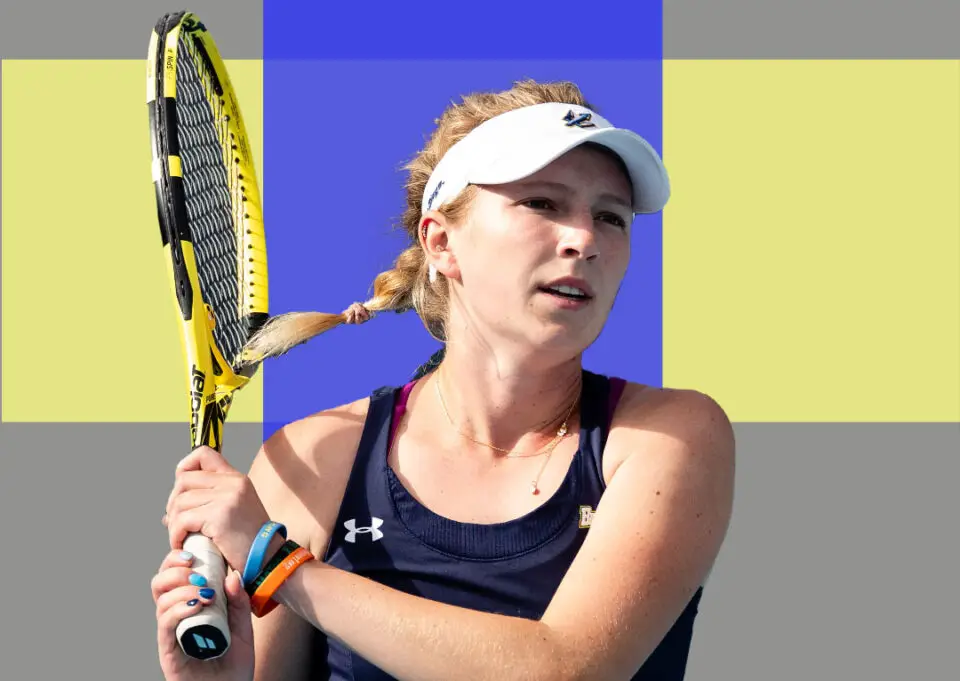REGION — For the first time ever, student-athletes at major regional colleges, including the University of California San Diego and San Diego State University, are profiting from their name, image and likeness, or NIL, after national rules prohibiting such benefits for players were lifted earlier this year.
In July, the National College Athletes Association, or NCAA, unveiled a new interim policy allowing collegiate athletes to take ownership over their athletic careers, breaking over 100 years of established policy and paving the way for sponsorships, endorsement deals and social media marketing campaigns.
For UCSD third-year tennis player Sophie Pearson, the new policy has had life-changing effects for her and many of her fellow athletes, many of whom she said have used NIL to market themselves and establish a second income.
“I think NIL’s been really nice especially for smaller sports that may not receive as much spotlight, such as tennis or golf…it’s really nice to have something extra to help when we can’t work part-time jobs because of our schedules,” Pearson said.
A nanoengineering major from Longmont, Colorado, Pearson said she has sponsorship deals from Playbooked, an online platform that connects fitness coaches with clientele, and Revly, a swim and activewear sports brand.
For Playbooked, Pearson gets compensated for her social media posts promoting the platform. For Revly, Pearson said she gets paid to show off the brand’s apparel on her various social media channels.
In the aftermath of the NCAA’s policy revision in July, social media platforms Instagram, Snapchat and Facebook have leveled the playing field for collegiate athletes, allowing virtually any student-athlete with a large social media following to take advantage of NIL, said Adrienne Larmett, a senior manager at Baker Tilly’s risk advisory practice focusing on higher education.

“Athletic performance isn’t the only determining factor in making these deals — it’s about social media presence, followers, and being marketable,” Larmett said. “That can really have an equalizing effect…it’s about followers, that means anybody can really engage and participate in NIL if they have a social media presence.”
Representatives for California State University San Marcos, Palomar College, and the University of San Diego — all Division II athletics programs — each told The Coast News that NIL has had little or no impact on their student-athletes.
“It hasn’t really had any benefit for D-2 schools so far,” said Mindy Mills, CSU San Marcos’s sports information director.
Uncharted territory
Athletic directors at UCSD and SDSU, both Division I NCAA schools, confirmed to The Coast News that a significant number of their athletes across a variety of sports programs have taken advantage of NIL.
“We encourage it, we think it’s great for our students,” said Jeff Tourial, an associate athletics director at UCSD.
Tourial said while the institution encourages students to get endorsements and sponsorship deals, challenges have come up ensuring they remain within UCSD’s guidelines that outline what students can and can’t do to market themselves.
The NCAA’s NIL policy broadly prohibits athletes from being compensated for work not performed (i.e. agreements without quid pro quo), payment for enrollment at a particular institution and compensation contingent upon athletic achievement or performance.
But beyond these standards, athletic programs are left to navigate a patchwork of NCAA rules, state laws and school-specific regulations on the issue, as there is currently no federal legislation governing NIL.
“It’s changing all the time and it’s muddy because there’s no national standard on this stuff,” Tourial said. “What we do in California is different from what an athlete in Nebraska might be able to do, so without that national baseline it’s really tricky.”
At UCSD for instance, while students are free to sign endorsement and sponsorship deals and appear in advertisements, they cannot conduct those activities on campus or wearing school apparel, as UCSD doesn’t want to be mistakenly represented by a brand or sponsor that it has no marketing deals with, Tourial said.
Conversely, SDSU has a less restrictive approach when it comes to NIL, similarly mandating that student-athletes follow NCAA guidelines but differing from UCSD in allowing the usage of school facilities for self-promotion, according to SDSU athletic compliance director Tim Lanski.
Thrilled to announce a partnership with @TeamAltemus and @AnomalyInsights to empower and educate Aztec student-athletes about the name, image and likeness (NIL) landscape. https://t.co/SFxU1gda7n
— San Diego State Aztecs (@GoAztecs) December 13, 2021
“Our policy is more permissive, our mindset is that our students should have a lot of freedom…we are internally committed to students doing this and taking advantage of this quite honestly,” Lanski said. “This is all new and there are so many unanswered questions, but overall this is a good thing for our student-athletes, and we’ll evolve over time and figure out this space better.”
However, Lanski agreed with Tourial that the lack of a national standard on NIL continues to create challenges for athletics programs when it comes to ensuring student compliance, asserting that there is a “desperate need for federal legislation” on the issue.
Earlier this month, SDSU announced a partnership between the university’s athletic department and consulting firms TeamAltemus and Anomaly Sports Group to help student-athletes navigate the NIL landscape.
The partnership will “provide NIL resources to assist student-athletes with the tools to protect their NIL and the money generated from it while educating on questions to ask throughout the process of NIL and potentially selecting a marketing representative,” an SDSU media release said.
Playing by the rules
In order to protect their athletes, it’s key that institutions of higher education invest time and resources into educating student-athletes on the applicable regulations concerning NIL, as a failure to do so could put NIL participants in jeopardy of being ineligible for the NCAA, said Larmett.
At UCSD, the athletics program utilizes COMPASS, an independent third-party program that allows students to submit their NIL deals through the vendor’s app, which then checks to ensure that the deals are in compliance with NCAA regulations as well as the relevant state and school policies, Tourial said.
Similarly, SDSU uses a combination of external vendors, including the compliance monitoring systems ARMS and Opendorse, to educate athletes and ensure ongoing eligibility, according to Lanski. Opendorse goes beyond helping with compliance and works directly with SDSU athletes to help them better market themselves and profit from their NIL, he added.
“Our partners…assist us with student-athlete assessment, education, and performance…they work with athletes on social education and marketing, increasing their social media following and things like that,” Lanski said.
In October, the entire SDSU football team struck a $20,000 endorsement deal with a nationwide moving franchise, according to a report from the San Diego Union-Tribune.
Larmett expressed that there’s some evidence that schools like SDSU that have the resources to help students increase their NIL benefits may have a recruiting advantage for their sports programs over institutions that lack such resources.
“If you have more resources, you’re able to offer more education and training to athletes on building a social media presence, on building a brand, things like how do you put yourself out there on the marketplace…we’re seeing the larger schools that have those resources more readily pulling those resources together quickly.”
CORRECTION: A previous version of this article incorrectly stated Sophie Pearson appeared in television advertisements for “Playbook.” However, the company is named “PlayBooked” and Pearson did not appear in television ads. We regret the error.



